TRIANGLE PROPORTIONALITY THEOREM
Theorem :
If a straight line is drawn parallel to one side of a triangle intersecting the other two sides, then it divides the two sides in the same ratio.
Given : In a triangle ABC shown below, a straight line is parallel to the side BC and it intersects the other two sides AB at D and AC at E.
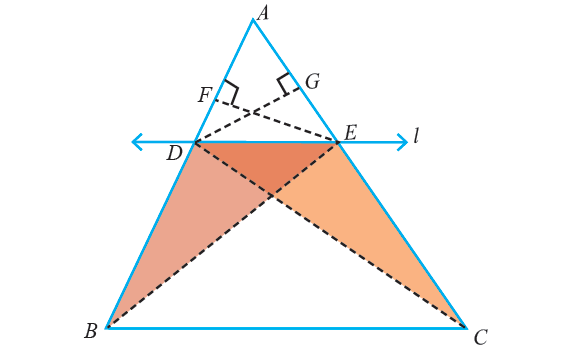
To prove : AD/DB = AE/EC.
Construction :
Join BE, CD.
Draw EF⊥AB and DG⊥CA.
Proof :
Step 1 :
Because EF ⊥ AB, EF is the height of the triangles ADE and DBE.
Area (ΔADE) = 1/2 ⋅ base ⋅ height = 1/2 ⋅ AD ⋅ EF
Area (ΔDBE) = 1/2 ⋅ base ⋅ height = 1/2 ⋅ DB ⋅ EF
Therefore,
Area (ΔADE)/Area (ΔDBE) :
= (1/2 ⋅ AD ⋅ EF)/(1/2 ⋅ DB ⋅ EF)
Area (ΔADE)/Area (ΔDBE) = AD/DB -----(1)
Step 2 :
Similarly, we get
Area (ΔADE)/Area (ΔDCE) :
= (1/2 ⋅ AE ⋅ DG) / (1/2 ⋅ EC ⋅ DG)
Area (ΔADE)/Area (ΔDCE) = AE/EC -----(2)
Step 3 :
But ΔDBE and ΔDCE are on the same base DE and between the same parallel straight lines BC and DE.
Therefore,
Area (ΔDBE) = Area (ΔDCE) ----(3)
Step 4 :
From (1), (2) and (3), we can obtain
AD/DB = AE/EC
Hence, the theorem is proved.
Problems 1-3 : Find the missing length indicated.
Problem 1 :
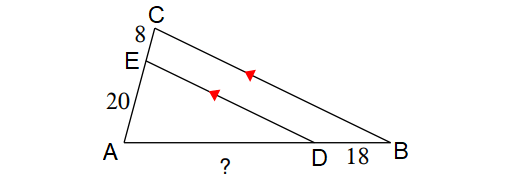
Solution :
In the triangle shown above, line segment ED is parallel to the side BD.
By Triangle Proportionality Theorem,
AD/DB = AE/EC
Substitute.
AD/18 = 20/8
AD/18 = 5/2
Multiply both sides by 18.
AD = 45
Problem 2 :

Solution :
In the triangle shown above, line segment ED is parallel to the side AC.
By Triangle Proportionality Theorem,
BE/EA = BD/DC
15/EA = (BC - DC)/DC
Substitute.
15/EA = (14 - 4)/4
15/EA = 10/4
15/EA = 5/2
Take reciprocal on both sides.
EA/15 = 2/5
Multiply both sides by 15.
EA = 6
Problem 3 :
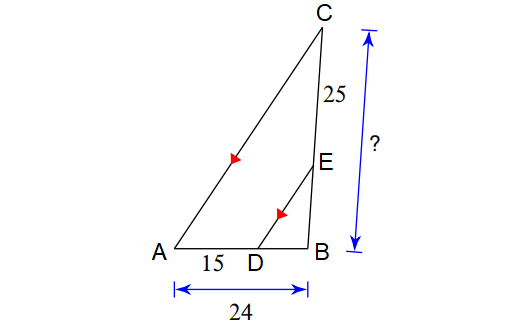
Solution :
In the triangle shown above, line segment ED is parallel to the side AC.
By Triangle Proportionality Theorem,
BD/DA = BE/EC
(BA - DA)/DA = BE/EC
Substitute.
(24 - 15)/15 = BE/25
9/15 = BE/25
3/5 = BE/25
Multiply both sides by 25.
BE = 15
BC = BE + EC
= 15 + 25
= 40
Problem 4 :
Solve for x.
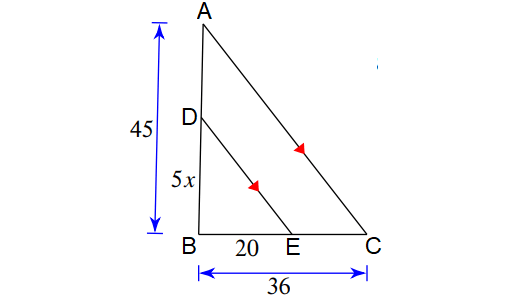
Solution :
In the triangle shown above, line segment ED is parallel to the side AC.
By Triangle Proportionality Theorem,
BD/DA = BE/EC
BD/(BA - DA) = BE/EC
BD/(BA - DA) = BE/(BC - BE)
Substitute.
5x/(45 - 5x) = 20/(36 - 20)
5x/(45 - 5x) = 20/16
5x/(45 - 5x) = 5/4
4(5x) = 5(45 - 5x)
20x = 225 - 25x
Add 25x to both sides.
45x = 225
Divide both sides by 45.
x = 5
Problem 5 :
Solve for x.
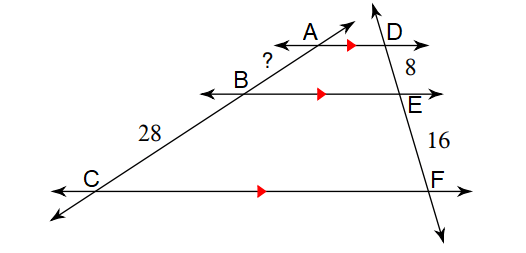
Solution :
In the diagram above, line segments AD, BE and CF are parallel to each other.
By Theorem,
AB/BC = DE/EF
Substitute.
AB/28 = 8/16
AB/28 = 1/2
Multiply both sides by 28.
AB = 14
Problem 6 :
Solve for x.
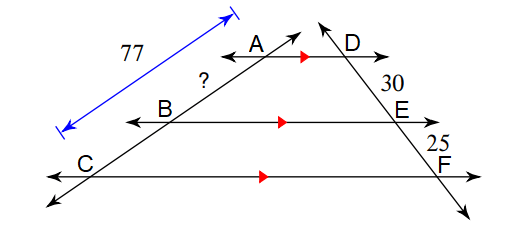
Solution :
In the diagram above, line segments AD, BE and CF are parallel to each other.
By Theorem,
AB/AC = DE/DF
AB/AC = DE/(DE + EF)
Substitute.
AB/77 = 30/(30 + 25)
AB/77 = 30/55
AB/77 = 6/11
Multiply both sides by 77.
AB = 42
Problem 7 :
Solve for x.
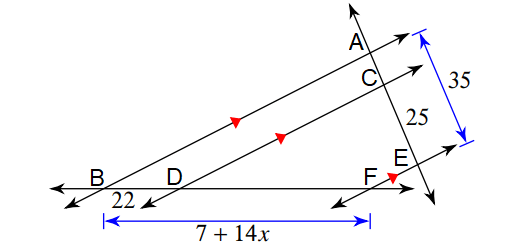
Solution :
In the diagram above, line segments AB, CD and EF are parallel to each other.
By Theorem,
AC/BD = CE/DF
(AE - CE)/BD = CE/(BF - BD)
Substitute.
(35 - 25)/22 = 25/(7 + 14x - 22)
10/22 = 25/(14x - 15)
5/11 = 25/(14x - 15)
5(14x - 15) = 11(25)
70x - 75 = 275
Add 75 to both sides.
70x = 350
Divide both sides by 70.
x = 5
Kindly mail your feedback to v4formath@gmail.com
We always appreciate your feedback.
©All rights reserved. onlinemath4all.com
Recent Articles
-
Digital SAT Math Problems and Solutions (Part - 150)
Apr 25, 25 11:46 AM
Digital SAT Math Problems and Solutions (Part - 150) -
AP Calculus AB Problems with Solutions (Part - 19)
Apr 24, 25 11:10 PM
AP Calculus AB Problems with Solutions (Part - 19) -
AP Calculus AB Problems with Solutions (Part - 18)
Apr 24, 25 11:06 PM
AP Calculus AB Problems with Solutions (Part - 18)
